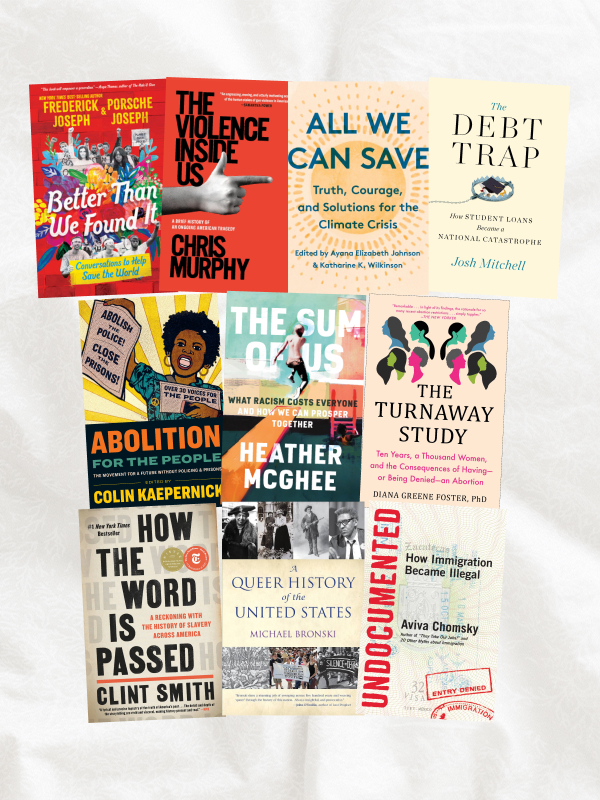Let us help you choose your next book! Welcome to Sweet Reads, a curation of titles hand-selected by our Sweet July community.
Election Day is right around the corner and a lot is at stake. It may not be a presidential election year (that’s in 2024), but several states are electing new governors, attorney generals and members of Congress. There are also a handful of referendums, which have the potential to legalize marijuana use, codify abortion access, and more. A political system that works for the people begins with informed voters insisting on our voices being heard.
You don’t need to be an expert on policymaking to have an opinion and be heard in the political process. The key is simply staying informed—understanding the societal problems we’re facing and the candidates who are and aren’t offering the most meaningful and sustainable solutions. From gun violence prevention to abortion care in a post-Roe world to the fight for free speech that doesn’t spread hate, here are 10 titles on key issues that should matter to voters across the country:
We recognize that all schedules are not created equal and you may not have time to read through 10 books before Election Day. This read offers an accessible and well-researched glance into a wide range of topics. Everything from Indigenous land theft to health care reform and housing security to ableism and beyond. The book is organized by a series of stories and conversations so you never feel talked at or over but rather talked to.
Connecticut-based U.S. Senator Chris Murphy previously represented the district where elementary school students at Sandy Hook were killed in their classrooms and has been a longterm advocate of gun violence prevention. Now, in The Violence Inside Us, Murphy walks us through a timeline of violence that has ballooned into a national epidemic.

Essay anthologies offer the chance to hear multiple expert perspectives and dive deep into a topic with more breadth than a curated algorithm typically allows. All We Can Save is one of the best anthologies I’ve read in a long time, bringing together activists, leaders and policymakers in a truly intergenerational reimagining of our relationship with the planet.
Throughout the pandemic, Americans with student loan debt have been teased with the prospect of debt cancellation. First, student loan payments were paused. Then, the Biden administration canceled $10,000 of debt with additional targeted programs for disabled people and public service workers. Weaving in first-hand anecdotes from borrowers, Mitchell tells the story of how a trillion-dollar industry was built on students’ backs.
Abolition for the People explores how media glamorizes policing, the school-to-prison pipeline, Black women’s invisibilized experiences with criminal justice and the myth of diverse police forces, to name a few. The essays—all written by parents of police brutality victims and leading political activists—are accompanied by reader guides, making this the perfect book to facilitate challenging conversations about how to fight crime without fighting the people who want what we all want: to have their needs met.
We need only look to recent attacks on affirmative action and federal injunctions against firms like Fearless Fund to see how revisionist history is affecting the present and the future of equity in America. How did our economy get so broken, and how do we find the courage to solve it? In The Sum of Us, McGhee explores what racism has cost us all (from unions and schools to housing and healthcare) and how we can start asking for a bigger pie.
The Turnaway Study confirms what 62% of Americans believe: that the Supreme Court’s decision was wrong and that women are better off with widespread access to abortion care. In this book, Foster’s evidence shows that women who safely received the abortions they sought were better off physically, emotionally, professionally and romantically. It closes with a chapter on abortion policy and how we can think of the issue more comprehensively in a post-Roe era.
This past May, President Biden called white supremacy “the single most dangerous terrorist threat in our homeland.” His words came just days before the one-year anniversary of 10 Black people being murdered in a Buffalo grocery store. Smith’s How The Word is Passed reiterates that public spaces across this country tell conflicting stories about whiteness, race and reconciliation. To stop the violence, we have to tell the whole truths about American history and stop white supremacy from growing.
There is a never ending debate over LGBTQ+ people’s right to use bathrooms, participate in athletics and otherwise take advantage of public space. This year, as the world danced to RENAISSANCE’s ballroom-inspired beats, a queer Black man named O’Shae Sibley was murdered at a gas station—proof that the community often labeled a threat is conversely in need of protection. Amidst profiles of queer and transgender Americans who have contributed to society, this book explores how far this country has gone to police desire and love—plus the efforts to reverse these attempts.
Chomsky first wrote the book They Take Our Jobs! And 20 Other Myths About Immigration to dispel the notions around people who immigrate into America. Now, in Undocumented, Chomsky exposes the social construct that is “illegality” and breaks down some structural solutions in lieu of the surveillance and violence at the U.S.-Mexico border.






